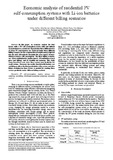Economic analysis of residential PV self-consumption systems with Li-ion batteries under different billing scenarios
Fecha
2019Autor
Versión
Acceso abierto / Sarbide irekia
Tipo
Contribución a congreso / Biltzarrerako ekarpena
Versión
Versión aceptada / Onetsi den bertsioa
Identificador del proyecto
ES/1PE/DPI2016-80642-R
Impacto
|
|
10.1109/EEEIC.2019.8783551
Resumen
In this paper, an economic analysis for four houses with a PV self-consumption system with and without Li-ion batteries is carried out. In particular three different ways of sizing PV and batteries are analyzed under three different billing scenarios for the compensation of surplus energy injected into the grid. All methods run under the same energy strategy, which maximizes self-consumption. The ...
[++]
In this paper, an economic analysis for four houses with a PV self-consumption system with and without Li-ion batteries is carried out. In particular three different ways of sizing PV and batteries are analyzed under three different billing scenarios for the compensation of surplus energy injected into the grid. All methods run under the same energy strategy, which maximizes self-consumption. The three billing scenarios are: (1) no retribution for surplus energy, (2) retribution at pool price (net billing), and (3) monthly net metering. This study shows how fixed costs make these systems just profitable for small systems. Moreover, the results show how the battery cost and lifespan affects the final profitability of the system and what future evolution in these factors is needed for making these systems profitable under different billing methods. [--]
Materias
Self-consumption,
Battery storage,
Netmetering,
Net-billing,
Distributed generation,
Prosumer,
Economic analysis
Editor
IEEE
Publicado en
2019 IEEE International Conference on Environment and Electrical Engineering and 2019 IEEE Industrial and Commercial Power Systems Europe (EEEIC / I&CPS Europe). Italy, 11-14 June 2019
Departamento
Universidad Pública de Navarra. Departamento de Ingeniería Eléctrica, Electrónica y de Comunicación /
Nafarroako Unibertsitate Publikoa. Ingeniaritza Elektrikoa, Elektronikoa eta Telekomunikazio Ingeniaritza Saila /
Universidad Pública de Navarra/Nafarroako Unibertsitate Publikoa. Institute of Smart Cities - ISC
Versión del editor
Entidades Financiadoras
Almacenamiento Renovable Avanzado de Litio para Autoconsumo Residencial interconectado (ARALAR) ‒ 0011-1411-2017-000021, Proyecto de I+D Gobierno de Navarra, and Hibridación de tecnologías avanzadas de almacenamiento eléctrico para sistemas basados en energías renovables DPI2016-80642-R (HIBRITAER)





